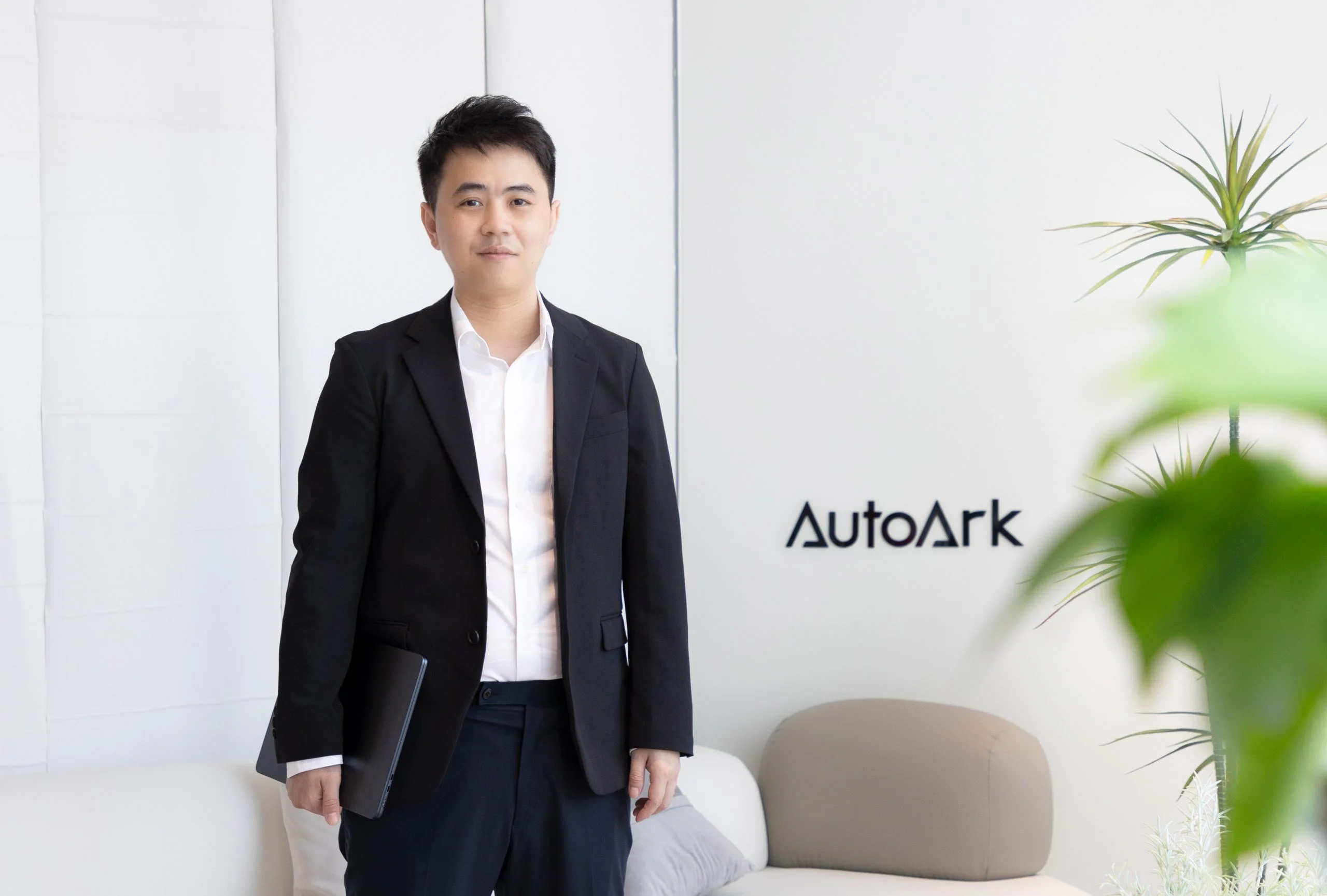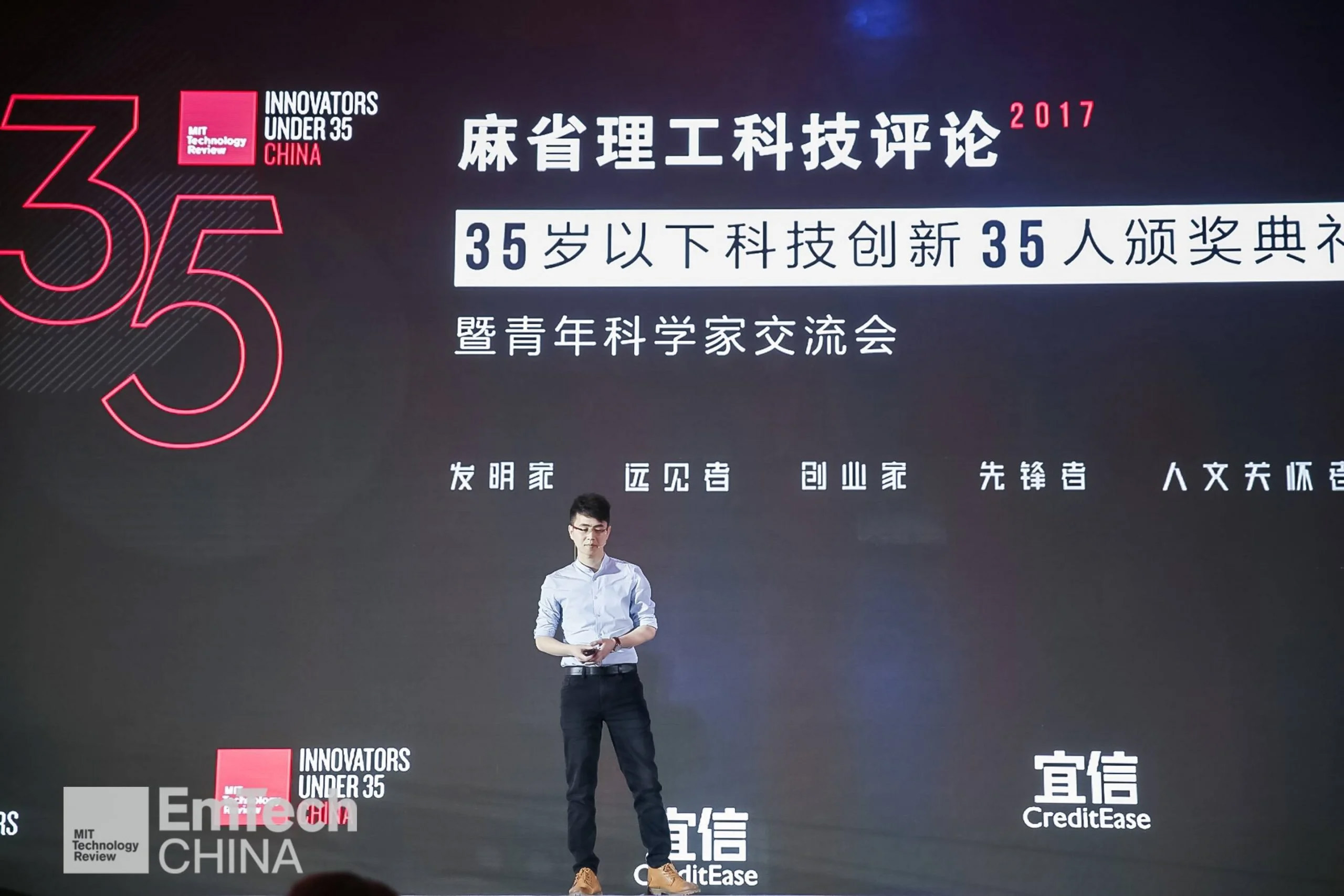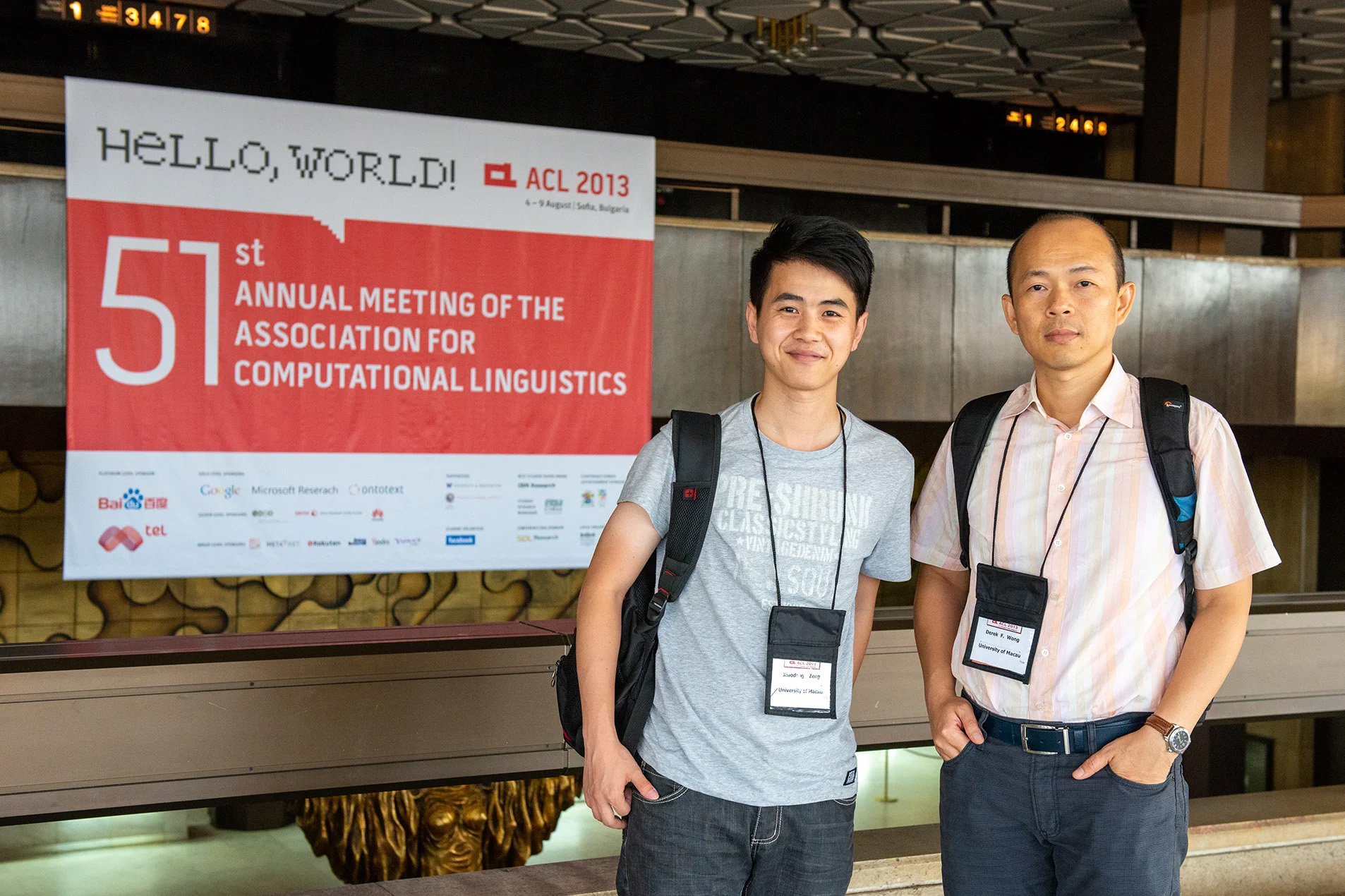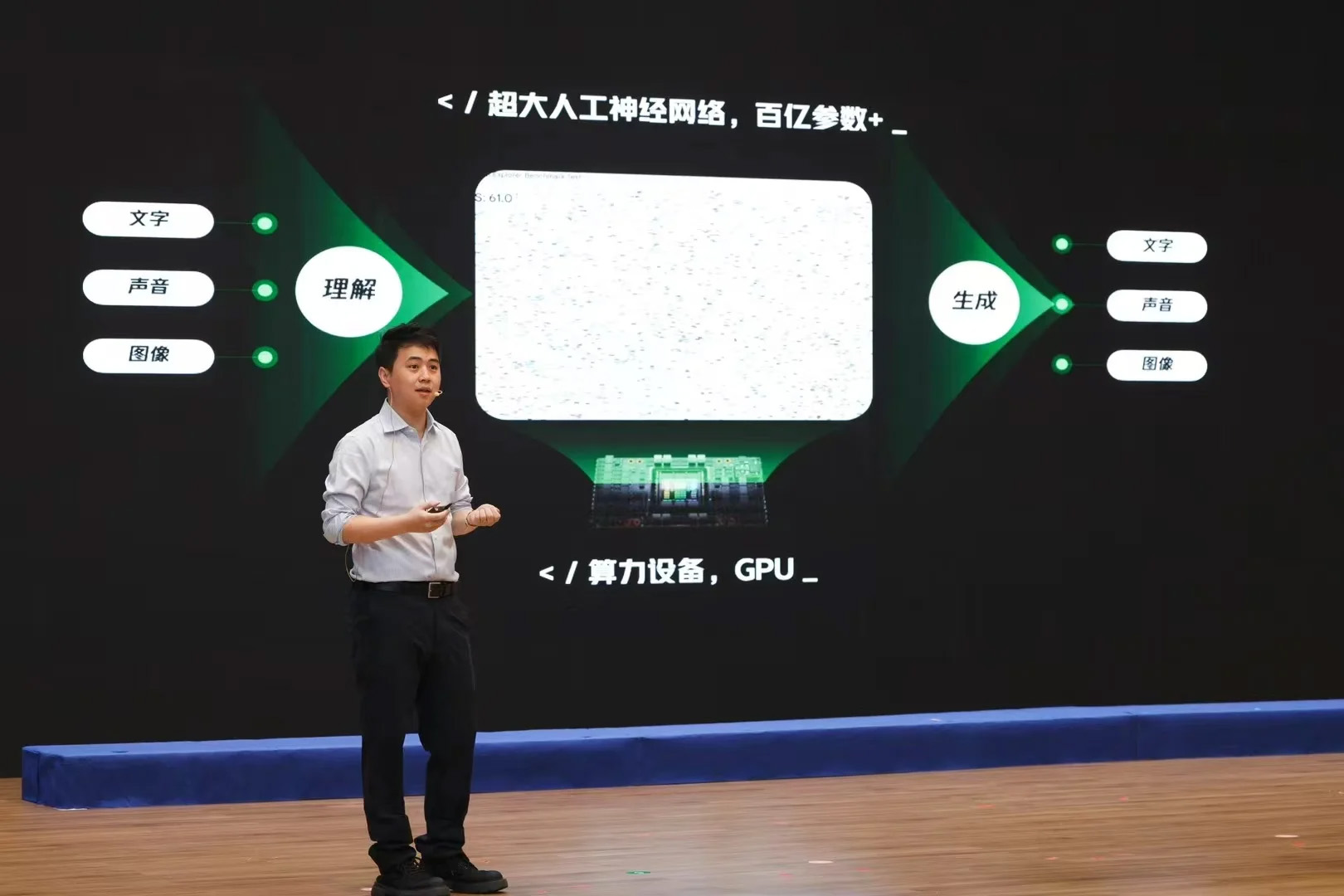After graduating from the University of Macau (UM) in 2012, Samuel Zeng, with expertise in natural language processing (NLP) and machine translation technologies, ventured into the e-commerce market. He quickly made his mark and was named one of the ‘35 Innovators Under 35 for China’ by MIT Technology Review in 2017. With a bold vision and an adventurous spirit, this UM alumnus left his position at Ant Group in 2023, undeterred by the unstable global economic climate, and founded AutoArk. This AI start-up has quickly gained significant attention and is dedicated to developing smart cities through innovative research.
The AI team in a spacecraft
A large piece of meteorite hangs from the mirrored ceiling in an open-plan office styled in white with futuristic designs, creating the impression of stepping into a miniature spacecraft. This distinctive setting is the office of AutoArk in Zhuhai.
On the day of his interview with My UM, Samuel was meeting with several provincial bankers in this ‘spacecraft’ to discuss credit extension details for his new project ‘ArkModel’. At the end of the meeting, he quickly came to meet us. He cheerfully noted that he usually wears casual attire to work, but on that day, he was dressed in a suit due to an official event in the morning where he received the title of ‘Zhuhai Industrial Development Partner’.
Under Samuel’s leadership, the AutoArk team launched ArkModel in May this year, a virtual researcher system that utilises AI and big data to conduct research in the field of medicine. Capable of performing the roles of multiple chemists and biologists, the system has revolutionised the traditional approach to scientific research in the field.
Samuel explains, ‘In the past, it took at least a month for a principal researcher and their assistants to achieve phased results. Now, with this system, there are 15 to 18 virtual experts working around the clock to process data.’
He adds that this continuously operating virtual team utilises large AI models to simulate human behaviours and execute instructions. The successful development of this technology is inseparable from the research foundation he established during his studies at UM. Samuel also points out that the basis of these large AI models is NLP technology.
An extension of university research
Pioneers in science and technology often reap the benefits of their era. Founded just a year ago, AutoArk has already gained recognition from the Zhuhai Municipal Government. The start-up has secured millions of yuan in funding and has been selected as one of the first group of AI companies identified as driving ‘new quality productive forces’ to advance Zhuhai’s scientific and technological development. Samuel feels very fortunate that his company has received this recognition.
Indeed, Samuel can be considered one of the pioneers in the fields of NLP and large AI models. He says, ‘The AutoArk project is actually an extension of my university major.’
In 2009, Samuel started his master’s studies in e-commerce technology at UM and joined the university’s Natural Language Processing & Chinese-Portuguese Machine Translation Laboratory (NLP2CT) led by Prof Wong Fai. He recalls that at that time, the field of machine translation was not yet popular, noting, ‘Many large-scale international academic conferences on machine translation had only about 200 participants from China.’
Despite the limited attention the field received, joining the NLP2CT research team has proved beneficial to Samuel’s career in AI and technological innovation. He explains that the technology behind large AI models actually originates from machine translation. Both fields attempt to mimic human brain functions, with machine translation specifically focusing on converting one language into another, where the main challenge is language comprehension.
Samuel continues, ‘Similarly, AI models, which aim to understand human language and help solve a variety of problems, grapple with a vast array of parameters during their training. An artificial neural network, such as a transformer, is typically employed to manage these complexities. The training of these models requires substantial computing power, leading them to be termed “large models”. Essentially, the task of these models is simple and mirrors the function of machine translation.’
From a less popular discipline to a significant field
Even today, Samuel still feels grateful for the time spent conducting experiments and writing papers at the university. At UM, he met his mentor, Prof Wong, who was supportive without being pushy and always tailored learning resources to meet student needs. In addition, UM provided well-equipped laboratories, allowing Samuel and his peers to conduct in-depth research in NLP and machine translation.
For Samuel, the most unforgettable experience at UM was having the paper he co-authored with his fellow students accepted by the Annual Meeting of the Association for Computational Linguistics (ACL), a high-level academic conference in the field of computational linguistics and NLP. He excitedly recalls, ‘I was waiting for the results in the laboratory with other students. When I learned that our paper was accepted, I was so happy that I couldn’t sleep all night.’
With the rapid development of information technology, machine translation has evolved into a crucial field. Samuel points out that the foremost experts in the field of large AI models mostly have a background in NLP or machine translation. ‘Thanks to UM’s NLP2CT, I have a considerable advantage in NLP. I have also noticed that NLP technology is receiving more attention these days,’ he remarks.
Flexing capabilities in the e-commerce market
During his studies at UM, Samuel conceived an idea: to leverage AI to make a meaningful impact on people’s lives. Realising that technology giants could provide the extensive resources needed to achieve this goal and would allow him to fulfil his potential, Samuel moved to Hangzhou and joined Alibaba after graduation.
With his expertise in NLP and machine translation technologies, Samuel made impressive achievements in the e-commerce market. He participated in the development of Alibaba’s first- and second-generation machine translation systems, which allowed him to gain experience in overcoming language barriers for retail and e-commerce companies. Samuel was later headhunted by Ant Group, where he established China’s first unstaffed cafe ‘Tao Coffee’, and developed the innovative ‘pay as you go’ technology, revolutionising the shopping and payment experiences for customers. Later, he joined Ant Group’s research and development (R&D) team, where he played a pivotal role in the launch of Alipay and many other innovative applications.
The unmanned retail technology of Tao Coffee developed by Samuel gained international recognition. In 2017, he was named one of the ‘35 Innovators Under 35 for China’ by MIT Technology Review, a testament to his capabilities in scientific and technological innovation. Notable past innovators on the ‘Innovators Under 35’ list include Google co-founders Larry Page and Sergey Brin, Facebook founder Mark Zuckerberg, and Yahoo founder Jerry Yang.
‘Of course, I was scared!’
In 2023, as the COVID-19 pandemic was coming to an end and the global economy was experiencing a slowdown, Samuel resigned from Ant Group, where he had worked for nine years. He decided to start his own business to pursue his dream.
Samuel shares, ‘When I resigned, the newer members of my team were shocked and would ask in disbelief, “Samuel, are you really going to start your business?” However, those who had worked with me for years were not surprised at all. They would simply say, “Samuel is born to be an entrepreneur.”’
Despite his ambition, Samuel had just started his family and his son was only two years old. He had enjoyed a stable, middle-class life in Shanghai. When asked if he was fearful about leaving his high-paying job to venture into entrepreneurship, Samuel admits, ‘Of course I was scared! I would be lying if I said otherwise.’
Fortunately, Samuel’s wife supported his decision to start his own business. ‘My wife held very different views from others. She was very supportive of my decision,’ Samuel recalls. He also shares how the couple met: ‘We met at Alibaba. Although our roles were different, it was through Alibaba that we came together.’ Samuel is grateful for his wife’s encouragement, emphasising her unique contributions, ‘With her extensive experience working in various countries and her familiarity with the international business environment, she brought valuable insights. She is a bold yet cautious person. Her advice undoubtedly boosted my confidence in starting my business.’
The name of Samuel’s company AutoArk was his wife’s idea. Samuel explains, ‘We both believed that those working in AI aspire to an automated lifestyle. Meanwhile, the vast amount of data involved was like an enormous ocean. It felt as though we were navigating this ocean in an ark to chase our dream and explore endless possibilities. This was the inspiration behind the name “AutoArk”.’
‘I have never taken advantage of anyone’
Reflecting on his entrepreneurial journey, Samuel states, ‘A day without problems is not a normal day.’
From the initial office renovations to dealing with clients, government officials, and bankers, and from recruiting and managing the R&D team to handling financing, Samuel has been deeply involved in every aspect of the company, tackling challenges one at a time. ‘I often need to stamp a lot of different documents. Once, I spent an entire day just doing that, and my hands were really sore afterwards,’ he shares.
Throughout his entrepreneurial journey, Samuel has received much help and support. Despite the numerous challenges he has encountered, he consistently addresses them with a calm and gentle demeanour, ensuring that he never vents his emotions on others.
Samuel reflects, ‘My emotional intelligence has been greatly shaped by my supervisor at UM, Prof Wong Fai. He has had a profound influence on my outlook on life. It is not easy to meet someone who is willing to discuss everything with you while consistently maintaining a gentle demeanour and guiding you in forming your life’s ideals.’
A calm demeanour makes people more approachable, and Samuel stresses that he ensures a peaceful work environment. ‘I can confidently say that over the years, I have never taken advantage of anyone who has worked with me, especially my classmates from UM.’
A familiar figure
On 31 May this year, at the press conference for the launch of AutoArk’s ArkModel, a familiar figure was present among the government officials, AI researchers, and entrepreneurs attending the event. That person was Prof Wong. He was there to support his former student Samuel. Samuel notes that he and Prof Wong have maintained a strong relationship even though he graduated many years ago. ‘I feel blessed to have met a teacher who is willing to support me throughout my life,’ he says.
As a start-up focused on developing products based on core and fundamental AI technologies, AutoArk must achieve new breakthroughs in large AI models to secure future success. Looking ahead, Samuel’s next goal is to collaborate with higher education institutions, and his priority is his alma mater, the University of Macau.
Source: My UM Issue 137
2012年,曾曉東在澳門大學畢業後,憑著他在自然語言處理和機器翻譯的技術優勢,馳騁電子商貿市場,並於2017年登上麻省理工MIT「中國35歲以下科創35人」榜單。這位校友自問膽識過人,2023年離職螞蟻集團,無懼全球經濟不明朗的形勢,創立了AI初創公司「無界方舟AutoArk」,如今備受青睞,力求以科創成果打造智慧城市。
「太空艙」裡的AI團隊
鏡面的天花板懸著半塊隕石,配上亮白的開放式Cyber設計,視覺上有如走進迷你的太空艙,這裡是「無界方舟AutoArk」在珠海的辦公室。
在這「太空艙」裡,曾曉東正與幾位省級銀行家開會,洽談有關新項目「方舟模型」的授信細節。會後,他箭步走來,接受《澳大人》的採訪,與我們相見甚歡,並提及平日工作衣著都是走休閒路線,只是剛好早上出席了官方活動,獲授予為「珠海產業發展城市合夥人」,才西裝上陣。
今年5月,他帶領AutoArk團隊推出「方舟模型」,該團隊基於AI大數據,針對醫藥研發領域,開發虛擬研究員系統,可同時扮演多位化學家、生物學家,顛覆了傳統的科研模式。
曾曉東說:「以前做科研,研究員帶著一群小夥伴,人手搞一個多月,才有階段性結構。現在用上這系統,就有15至18位虛擬專家24小時不眠不休地幫你跑數據。」
他解釋道,這個不斷在跑的虛擬團隊,是透過AI大模型去模擬人類,並執行指令,而這項技術的成功開發,離不開他在澳大深造時所奠下的科研根基。他更指出,AI大模型的起源,就是自然語言處理(NLP)技術。
延續大學研究
勇於走在科技前沿的人,往往就能抓住時代機遇。AutoArk去年才成立,作為一家新的初創公司,卻獲珠海人民政府賞識,注資千萬級别人民幣,並當選為第一批AI新質生產力代表,參與珠海科創建設,曾曉東形容「非常幸運」。
從自然語言技術到AI大模型,曾曉東走在行業的前沿,並說:「AutoArk的主打項目,其實算是我大學專業的一個延續。」
2009年,曾曉東入讀澳大,修讀電子商貿科學碩士,並加入由黃輝教授帶領的自然語言處理與中葡機器翻譯實驗室(NLP2CT)團隊。他清晰記得,當時機器翻譯專業比較冷門,「因為許多大型的國際學術會議,全國就只得兩百多人參加。」
對曾曉東來說,當年參與NLP2CT的研究學習,對他往後從事AI科創工作幫助甚大。他解釋,AI大模型技術來源於機器翻譯,因為兩者都是在模擬人腦的運作,機器翻譯是把一種語言轉換成另一種語言,難就難在對語言的理解。
他說:「當AI能理解人類的語言,並替人類解決問題時,它要面對的是龐大的參數量,這中間就會出現人工神經網絡(Transformer)。如我們用上規模巨大的算力去訓練模型,就能稱之為『大模型』。實際上,它的任務極其簡單,跟機器翻譯一模一樣。」
冷門專業不再冷
曾曉東想起在澳大做實驗、寫論文的時光,依舊覺得慶幸,不僅遇到恩師——黃輝教授,他從不緊迫盯人,而是按照學生的需求提供學習資源,母校實驗室設備完善,讓他和同學有充裕的條件在自然語言處理和機器翻譯領域沉潛深挖。
對他而言,求學最難忘的事情,莫過於論文第一次入選了計算語言學和自然語言處理領域的頂級學術會議ACL(Annual Meeting of the Association for Computational Linguistics)。「當晚,我和大家一起在實驗室等待結果,得知入選,開心到一夜沒睡。」
隨著時代的進步加上資訊科技日新月異,當年的冷門專業如今變得炙手可熱。曾曉東直言,最懂AI大模型領域的專家,一定具備自然語言處理或機器翻譯的技術背景,「我在NLP有相對豐富的專業經驗,還得歸功於澳大的NLP2CT,而且我也看到NLP技術如今也越來越備受重視。」
馳騁電商市場
求學期間,曾曉東萌生了一個想法,就是用AI做一些對人類有意義的東西。科技巨擘能提供龐大的資源,讓他盡情發展所長,於是在畢業後,他去了杭州的阿里巴巴工作。
曾曉東憑著他在NLP和機器翻譯領域的技術優勢,馳騁電子商貿市場。他參與研發阿里巴巴第一代和第二代的機械翻譯系統,積累了零售和電子商務企業打破語言障礙的經驗。後來他被挖角到螞蟻集團,並創造了中國首家無人店「淘咖啡」,開發了「即走即付」新技術,帶來嶄新的購物支付體驗。後來,他加入了螞蟻集團的研發團隊,當中支付寶等許多創新應用程式的面世,他稱得上是幕後功臣之一。
他的「淘咖啡」無人店技術獲國際認可。2017年,《麻省理工科技評論》評選曾曉東為「中國35歲以下科技創新青年35人」發明家,對他的科創實力予以全球權威的肯定。谷歌聯合創始人Larry Page 和 Sergey Brin、Facebook 創始人Mark Zuckerberg、雅虎創始人楊致遠亦曾榜上有名。
「怕,當然怕」
2023年,正當新冠疫情剛結束、全球經濟整體減緩的形勢下,曾曉東毅然辭職,結束他在螞蟻集團長達9年的工作,決定為自己的理想創業。
他說:「剛進入我團隊的小夥伴比較驚訝,會難以置信地問『苗哥(曾的英文名Samuel的別稱)要去創業嗎?』但與共事多年的同事卻會說:『森苗(Samuel音譯)天生就是去創業』。」
然而,剛成家的曾曉東,兒子才滿兩歲,一直在上海過著安穩的中產生活,霎時放棄高薪厚祿,投身創業,當時的他究竟怕不怕?他直言:「怕,當然怕!說不怕的,那肯定是騙人,對吧?!」
幸好,曾曉東身邊有一位支持他創業的妻子,「我太太跟其他人的看法相反,很贊成我立業」。他們倆在阿里工作時相識,妻子負責淘寶的相關產品設計,他笑言,「一個搞淘寶,一個搞支付寶,兩個『寶』後來走在一起。」他很感謝太太的鼓勵,「她曾在不同的國家工作,熟悉國際環境,營商經驗豐富,而且行事理性,膽大心細。她的意見無疑是為我打了一劑強心針。」
「AutoArk無界方舟」就是由曾曉東的妻子命名。他補充:「我倆一致認為,搞AI的人都希望生活最終邁向全Auto(自動),而龐大的數據有如汪洋大海,我們就在大海中揚帆追夢,乘著Ark(方舟)探索無限的可能,AutoArk也由此誕生。」
「對得起任何人」
創業至今,曾曉東形容「沒有問題的一天,是不正常的」。
從最初辦公室裝修,跟不同的人包括客戶、政府官員、銀行家打交道,招募和管理研發團隊,到現在融資決策,他凡事親力親為,逐一把問題解決。「很多時候,需要為不同文件蓋章,有一次我蓋了一整天的章,手都疼了。」
在曾曉東創業的路上,有很多小夥伴也願意追隨他,助他一臂之力。即使問題再多,他都以從容、溫和的態度去面對,不會把情緒宣洩到他人身上。
他說:「我的情商修為,肯定是隨我在澳大的導師黃輝教授,他以身作則,對我的人生觀的建立頗有影響,你很少會碰到一個人永遠都用極其溫和的態度,跟你聊任何事情,並引導你去構建人生理想。」
平和的性情,讓人更具親和力,而曾曉東表示他一直把這份平和帶到工作中,「這麼多年,我敢拍胸脯說,我沒有對不起身邊任何一個與我共事的人,尤其是我的同學。」
熟悉的身影
今年5月31日,在AutoArk推出「方舟模型」的新聞發佈會上,除了眾多政府官員、AI研究員、企業家外,還出現了一個熟悉的身影——黃輝教授,他特意前來出席,為學生站台。他說,即使畢業多年,大家仍保持良好的師生關係,「能找到願意為你站台的老師,是一件很幸福的事。」
AutoArk作為以AI底層核心技術開發產品的初創企業,未來要再下一城,就須在AI大模型領域取得新突破,而曾曉東希望能與高校合作,而他的首選也是自己的母校——澳大。
來源:《澳大人》第137期






